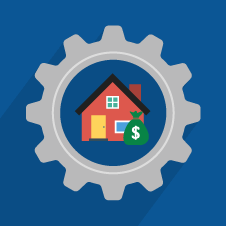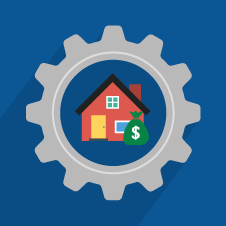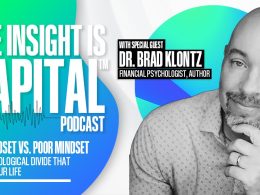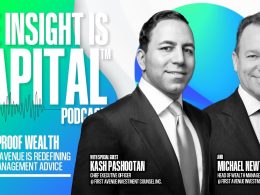No Place Like Home: Helping Millennial Homebuyers
by Commonwealth Financial Network
 In your meetings with baby boomer clients, do conversations ever arise about their millennial children? Maybe Michael is finishing grad school, or Lizzy just moved out at 26. Have you noticed any trends in this younger generation—perhaps that after years of dragging their feet to settle down and buy a home, they finally are entering the market? You may want to consider taking note, as helping millennial homebuyers could allow you to expand the reach of your advisory firm.
In your meetings with baby boomer clients, do conversations ever arise about their millennial children? Maybe Michael is finishing grad school, or Lizzy just moved out at 26. Have you noticed any trends in this younger generation—perhaps that after years of dragging their feet to settle down and buy a home, they finally are entering the market? You may want to consider taking note, as helping millennial homebuyers could allow you to expand the reach of your advisory firm.
It’s true—millennials have been slow to enter the homebuying market, waiting far longer than Generation X and baby boomers to purchase their first home. Why? High student loan debt is a major contributor, as it has more than doubled to $1.5 trillion in the last decade, according to NPR. With this burden eating into their savings, millennials have had to put a lot of milestones, such as moving out, getting married, and having children, on hold. Instead, their focus has shifted to establishing a career first, and not only that, but a career they are passionate about, making them more likely to change jobs and locations until they find the right fit. Because of this, millennials have been less willing to commit to one city or neighborhood and more eager for the flexibility and freedom of renting instead.
But beginning in January 2017, millennials made a decisive entry into the housing and mortgage markets, becoming the generation with the largest number of new mortgages. By November 2018, millennials originated the highest dollar amount of new mortgages, according to Realtor.com. But this late move is not the only trend that sets millennials apart in the homebuying process.
Affordability of a starter home is another stark difference. Research compiled by DataTrek puts the median price of homes purchased by millennials at $238,000. In contrast, the median purchase price for Generation X is $289,000, and the median price for baby boomers is $264,000. Millennials also are willing to purchase a fixer-upper to create personalized, environmentally friendly, and technology-driven living spaces and to save money with a lower mortgage.
Despite these numbers, there are several classic barriers to homeownership these under-40-somethings encounter, and they could benefit from the advice of a qualified financial advisor.
The major challenges that millennials face are the same that every generation faces: developing a solid credit score and saving for a down payment, both of which can be compounded by student loan debt. Without experience or a trusted guide, millennials can easily make the wrong decision for their situation—whether it be opting for too small a down payment or buying a house they can’t afford. Thankfully, there are several tools and programs available that are perfect for helping millennial homebuyers.
Credit score. Most borrowers recognize the term FICO (Fair Issac Corporation) and associate it with the credit scores reported by TransUnion, Equifax, and Experian. Borrowers may not fully understand how lenders use their credit scores, however, so it’s important to break it down for them. FICO scores range from 350 to 850. Mortgage borrowers usually need credit scores above 760 to obtain the most favorable rates. Borrowers with scores below 620 may be denied a mortgage.
This year, FICO will release Ultra FICO, a new model to help individuals boost their credit score. Ultra FICO will allow homebuyers to volunteer details about their checking, savings, and money market accounts. The addition of deposit account information is expected to increase credit scores by approximately 20 points. This bump may be very helpful to millennials, who graduated during the Great Recession and experienced difficulties that lowered their credit scores. Ultra FICO should also benefit millennials in their 20s who may have limited credit histories.
Down payment. After the credit score comes the down payment. The traditional benchmark for avoiding private mortgage insurance is a down payment of 20 percent of the home’s value, but data from the National Association of Realtors reveals that most buyers, particularly first timers, make down payments of 6 percent or less. This is a problem. So, how can you help?
Several government programs allow borrowers to obtain a mortgage without a 20-percent down payment. The United States Department of Veterans Affairs has probably the most recognized government mortgage loan program. Qualifying service members enjoy the benefits of a zero down payment, no mortgage insurance, and low closing costs. Loans guaranteed by the Federal Housing Administration (FHA) are also a popular option. FHA loans allow a minimum down payment of 3.5 percent for borrowers with credit scores above 580. FHA loans have up-front and annual mortgage insurance premiums, however, which add to the mortgage expense.
There are other lesser-known government programs to assist millennials, which include:
- United States Department of Agriculture’s (USDA) Rural Development Guaranteed Housing Loan. This is probably the least-known loan source. Even more surprising is that it may be possible to get a loan through the Rural Development program even for an urban area.
- Fannie Mae’s HomeReady Program. This allows a 3-percent down payment. Borrowers with credit scores above 680 can get more favorable rates, and they can cancel their mortgage insurance after their equity reaches 20 percent of the home’s value.
- Freddie Mac’s Home Possible Advantage. This program also allows a 3-percent down payment and cancellation of mortgage insurance once equity builds to 20 percent. This program may be an option for borrowers without a credit history, and it allows borrowers to put “sweat equity” into their homes.
Eligibility for each program is based upon the average area median income (AMI) in a home’s geographic location. Each year, the United States Department of Housing and Urban Development calculates the AMI for every geographic area in the country. Since most millennials have not yet reached their peak earning years, an income-based program that features a low down payment may help secure their home purchase.
With most millennials finished with school and in the process of building their careers and adult life, many are finally taking the steps to settle down and purchase their first home. These younger clients’ changing financial needs present a number of opportunities for your firm:
- Add new services. By offering to help clients with saving for a down payment, choose their best mortgage option, or decide on homeowner’s insurance, you increase your own experience and knowledge base, thereby also increasing your value as the advisor.
- Strengthen relationships with your clients’ children. Talk to your clients about their children’s plans, and offer to speak with them about the options available. Doing so can increase your chance of keeping inherited assets with the firm.
- Bring in new clients. By offering more specialized services, you may be more likely to attract this still largely untapped market of investors.
To best position yourself as a trusted resource, be sure to stay abreast of developments, trends, and tools available for this demographic. For now, the one trend that is certain is that millennials will continue to shape the housing and mortgage markets. Are you ready to lend a hand?
Do you have experience in helping millennial homebuyers? What have you learned from the process? Please share your thoughts below!
Commonwealth Financial Network is the nation’s largest privately held independent broker/dealer-RIA. This post originally appeared on Commonwealth Independent Advisor, the firm’s corporate blog.
Copyright © Commonwealth Financial Network















